
The mousebirds are birds in the order Coliiformes. They are the sister group to the clade Cavitaves, which includes the Leptosomiformes, Trogoniformes (trogons), Bucerotiformes, Piciformes and Coraciformes. This group is now confined to sub-Saharan Africa, and it is the only bird order confined entirely to that continent, with the possible exception of turacos which are considered by some as the distinct order Musophagiformes, and the cuckoo roller, which is the only member of the order Leptosomiformes, and which is found in Madagascar but not mainland Africa. Mousebirds had a wider range in the Paleogene, with a widespread distribution in Europe and North America during the Paleocene.

Jean Victor Audouin, sometimes Victor Audouin, was a French naturalist, an entomologist, herpetologist, ornithologist, and malacologist.

Henri Milne-Edwards was an eminent French zoologist.

Alphonse Milne-Edwards was a French mammalogist, ornithologist, and carcinologist. He was English in origin, the son of Henri Milne-Edwards and grandson of Bryan Edwards, a Jamaican planter who settled at Bruges.

Xanthidae is a family of crabs known as gorilla crabs, mud crabs, pebble crabs or rubble crabs. Xanthid crabs are often brightly coloured and are highly poisonous, containing toxins which are not destroyed by cooking and for which no antidote is known. The toxins are similar to the tetrodotoxin and saxitoxin produced by puffer fish, and may be produced by bacteria in the genus Vibrio living in symbiosis with the crabs, mostly V. alginolyticus and V. parahaemolyticus.

Charles Émile Blanchard was a French zoologist and entomologist.
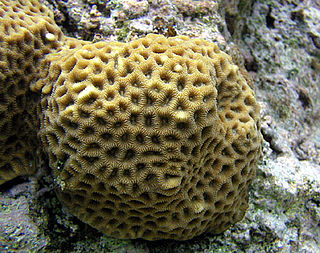
Brain coral is a common name given to various corals in the families Mussidae and Merulinidae, so called due to their generally spheroid shape and grooved surface which resembles a brain. Each head of coral is formed by a colony of genetically identical polyps which secrete a hard skeleton of calcium carbonate; this makes them important coral reef builders like other stony corals in the order Scleractinia. Brain corals are found in shallow warm water coral reefs in all the world's oceans. They are part of the phylum Cnidaria, in a class called Anthozoa or "flower animals". The lifespan of the largest brain corals is 900 years. Colonies can grow as large as 1.8 m (6 ft) or more in height.

Polyclinidae is a family of tunicates in the order Aplousobranchia.

Majidae is a family of crabs, comprising around 200 marine species inside 52 genera, with a carapace that is longer than it is broad, and which forms a point at the front. The legs can be very long in some species, leading to the name "spider crab". The exoskeleton is covered with bristles to which the crab attaches algae and other items to act as camouflage.

Elaphurus is a genus of deer. E.davidianus is the only extant species and several fossil species are described.

Botrylloides is a genus of ascidian tunicates in the family Styelidae.
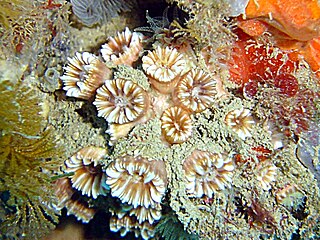
The Caryophylliidae are a family of stony corals found from the tropics to temperate seas, and from shallow to very deep water.
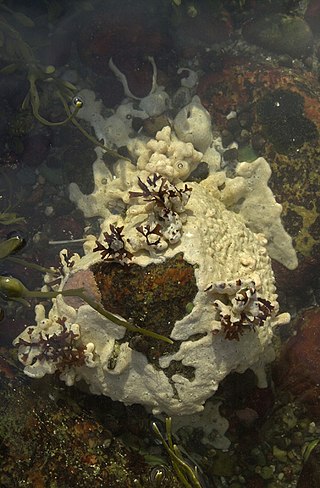
Aplousobranchia is an order of sea squirts in the class Ascidiacea, first described by Fernando Lahille in 1886. They are colonial animals, and are distinguished from other sea squirts by the presence of relatively simple pharyngeal baskets. This provides the etymology of their name: in ancient greek, ἁ.πλοος-ους (ha.ploos-ous) means "simple". The posterior part of the abdomen contains the heart and gonads, and is typically larger than in other sea squirts.
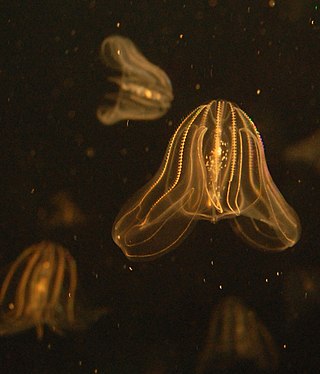
Bolinopsidae is a family of ctenophores.
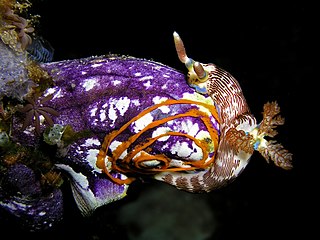
Styelidae is a family of ascidian tunicates.

Merulinidae is a family of reef-building stony corals.

Heterocyathus is a genus of coral of the family Caryophylliidae.

Desmophyllum is a genus of cnidarians belonging to the family Caryophylliidae.

















